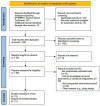Effects of SGLT-2 inhibitors on clinical and biological hyperandrogenism and menstruation irregularities in patients with polycystic ovary syndrome: A systematic review of randomized trials
- PMID: 39713268
- PMCID: PMC11660270
- DOI: 10.1177/20503121241308997
Effects of SGLT-2 inhibitors on clinical and biological hyperandrogenism and menstruation irregularities in patients with polycystic ovary syndrome: A systematic review of randomized trials
Abstract
Introduction: Polycystic ovary syndrome is a common chronic condition characterized by insulin resistance and hyperandrogenism, leading to significant health risks and impaired quality of life. Sodium-glucose transporter type 2 inhibitors have shown promise in improving the metabolic profile of women with polycystic ovary syndrome. However, their impact on hormonal parameters and cycle disorders remains uncertain.
Methods: This systematic review analyzed randomized clinical trials published up to 1 December 2023, comparing sodium-glucose transporter type 2 inhibitors to metformin, other antidiabetic agents, or placebo in women with polycystic ovary syndrome. The primary outcomes were changes in total testosterone, free androgen index, dehydroepiandrosterone sulfate, delta-4 androstenedione, and cycle disorders.
Results: Five randomized studies were included, evaluating canagliflozin, dapagliflozin, licogliflozin, or empagliflozin against metformin, exenatide, or placebo, with a total of 214 participants. Improvements in total testosterone and dehydroepiandrosterone sulfatewere observed in some studies, but the effects were inconsistent across drugs and outcomes. Additionally, two studies reported beneficial effects on cycle disorders.
Conclusions: Sodium-glucose transporter type 2 inhibitors appear to have a potential but variable impact on hormonal parameters in women with polycystic ovary syndrome. However, larger and longer-duration studies are needed to fully elucidate their long-term efficacy in addressing hyperandrogenism and improving overall outcomes in these patients.
Keywords: Polycystic ovary syndrome; randomized controlled trial; sodium-glucose transporter 2 inhibitors; systematic review.
© The Author(s) 2024.
Conflict of interest statement
The author(s) declared no potential conflicts of interest with respect to the research, authorship, and/or publication of this article.
Figures


Similar articles
-
Role of Sodium-Glucose Cotransporter-2 Inhibitors in Managing Polycystic Ovary Syndrome: A Systematic Review.touchREV Endocrinol. 2025 May;21(1):32-41. doi: 10.17925/EE.2025.21.1.2. Epub 2025 Jan 28. touchREV Endocrinol. 2025. PMID: 40485656 Free PMC article.
-
Canagliflozin combined with metformin versus metformin monotherapy for endocrine and metabolic profiles in overweight and obese women with polycystic ovary syndrome: A single-center, open-labeled prospective randomized controlled trial.Front Endocrinol (Lausanne). 2022 Sep 6;13:1003238. doi: 10.3389/fendo.2022.1003238. eCollection 2022. Front Endocrinol (Lausanne). 2022. PMID: 36147577 Free PMC article. Clinical Trial.
-
Hyperandrogenemia in polycystic ovary syndrome: exploration of the role of free testosterone and androstenedione in metabolic phenotype.PLoS One. 2014 Oct 13;9(10):e108263. doi: 10.1371/journal.pone.0108263. eCollection 2014. PLoS One. 2014. PMID: 25310562 Free PMC article.
-
AMERICAN ASSOCIATION OF CLINICAL ENDOCRINOLOGISTS, AMERICAN COLLEGE OF ENDOCRINOLOGY, AND ANDROGEN EXCESS AND PCOS SOCIETY DISEASE STATE CLINICAL REVIEW: GUIDE TO THE BEST PRACTICES IN THE EVALUATION AND TREATMENT OF POLYCYSTIC OVARY SYNDROME--PART 1.Endocr Pract. 2015 Nov;21(11):1291-300. doi: 10.4158/EP15748.DSC. Endocr Pract. 2015. PMID: 26509855
-
Novel Antidiabetic Medications in Polycystic Ovary Syndrome.Discoveries (Craiova). 2022 Mar 31;10(1):e145. doi: 10.15190/d.2022.4. eCollection 2022 Jan-Mar. Discoveries (Craiova). 2022. PMID: 36518222 Free PMC article. Review.
Cited by
-
Subclinical Hypothyroidism in Polycystic Ovary Syndrome: Prevalence and Impact on Metabolic and Cardiovascular risk.Clin Med Insights Endocrinol Diabetes. 2025 Jun 3;18:11795514251343678. doi: 10.1177/11795514251343678. eCollection 2025. Clin Med Insights Endocrinol Diabetes. 2025. PMID: 40469218 Free PMC article.
References
-
- Mukherjee S, Maitra A. Molecular and genetic factors contributing to insulin resistance in polycystic ovary syndrome. Indian J Med Res 2010; 131: 743–760. - PubMed
Publication types
LinkOut - more resources
Full Text Sources

